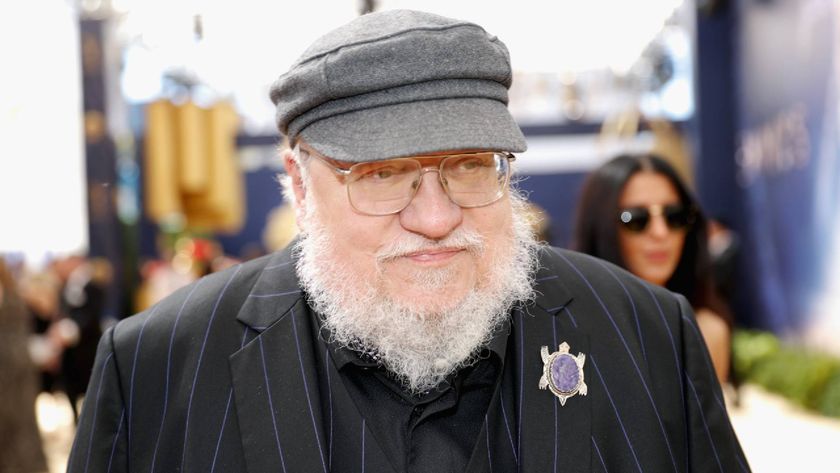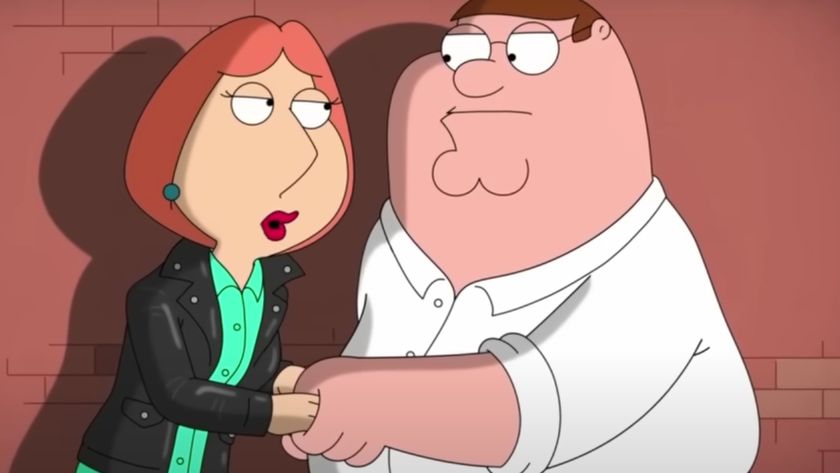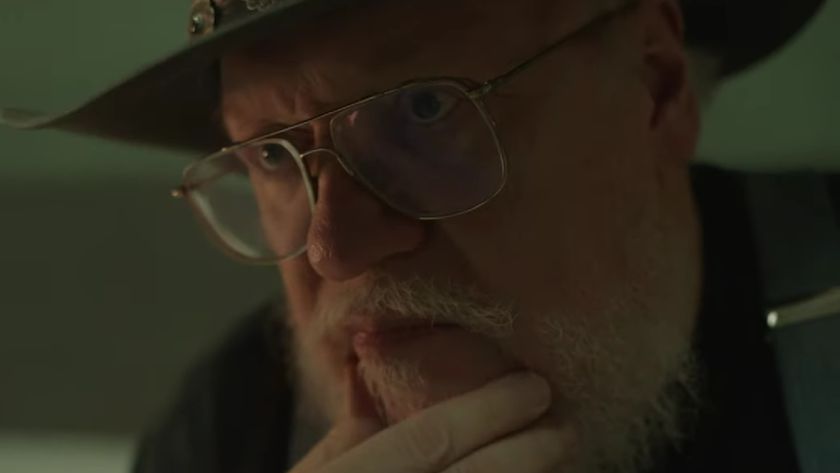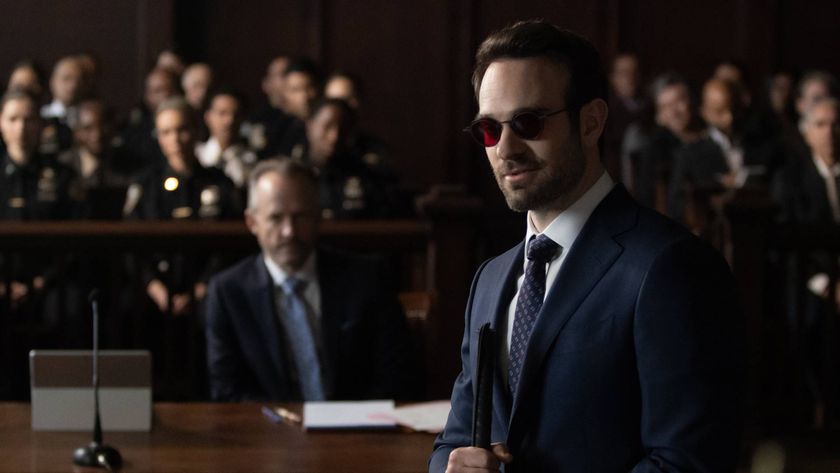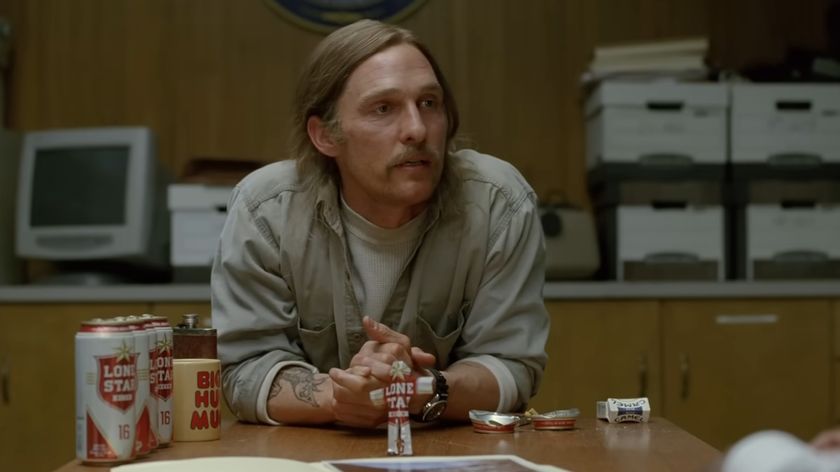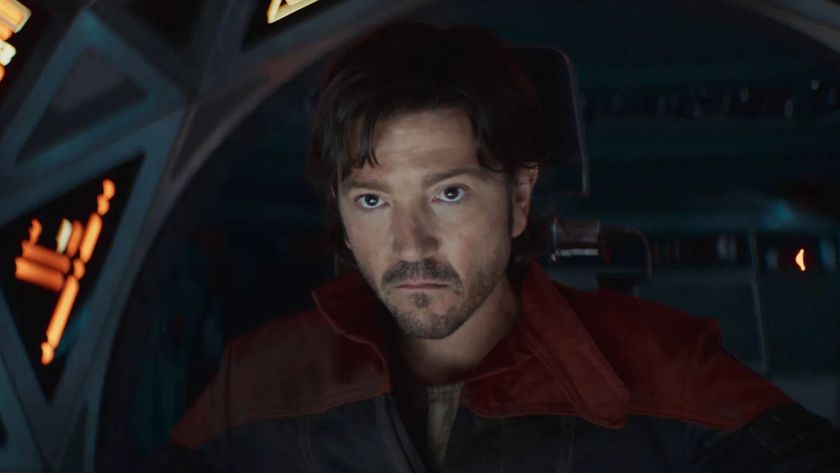Rediscovering Sherlock's Victorian roots on the set of The Abominable Bride
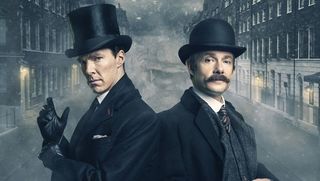
Five years ago, Steven Moffat and Mark Gatiss pulled off the unthinkable. Modernising Sherlock Holmes had seldom been attempted before, much less with any success, and initial reports of the Beeb’s contemporary update were met with scepticism from Doyle aficionados and the general public alike. How wrong we all were...
Now, in 2015, what has become unthinkable is placing Benedict Cumberbatch’s Holmes and Martin Freeman’s Watson back in the Victorian period from whence they came – and so, naturally, Moffat and Gatiss set out to do just that with this year’s Christmas special. “We’re not just doing an extended Comic Relief sketch,” Gatiss reassures Crime Scene, when we meet on an appropriately frosty day in Bristol. “It’s a very strong mystery, a full-blooded Gothic horror – we’re not just dressing up and saying ‘Look at my sideburns!’” Ten minutes into Sherlock’s debut episode, Moffat points out, we were so engrossed that the modern-day setting ceased to matter, “and you’ll find the same here. Within a few minutes, it’s just Sherlock Holmes.”
Both Gatiss and Moffat are self-confessed Arthur Conan Doyle devotees, peppering their responses with fannish asides and wry references to the character’s canon. Their co-scripting process for "The Abominable Bride" has been one of reverse-engineering, situating their own modern interpretation back in Victorian London without compromising any of its ingenuity, its darkness or its boldness. “It’s thrilling, because a lot of the heavy lifting is done for you,” explains Cumberbatch, who’s evoking Jeremy Brett’s classic Holmes with slicked-back hair in place of unruly curls. “It’s Holmes in his natural time and era, and I don’t feel as though I’m trying to carry what the modern version does, where he’s a Victorian man out of time.”
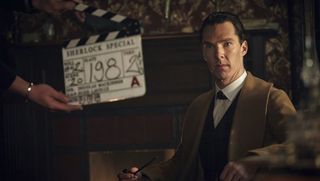
Sherlock’s third series ended its run in early 2014 on a characteristically gruelling cliffhanger. Sherlock has killed a man (Lars Mikkelsen’s viscerally unpleasant Magnussen) in defence of John and a newly pregnant Mary (Amanda Abbington), and is about to go into hiding, only to be called back by the seeming return of Andrew Scott’s Moriarty. In a sense, opting to casually swoop back in two years later with a completely unrelated one-off episode is cruel, but in Moffat and Gatiss’s defence their hands were tied by mind-boggling schedule conflicts. In a year where Cumberbatch is packing in a run as Hamlet on stage and the lead in a Marvel movie, eking out enough time to shoot even one episode was a feat. “This special came about because there was a gap to do one, and we realised it would be silly to do it as episode one and then film another two quite a lot later,” Gatiss explains.
But if the cliffhanger of "His Last Vow" isn’t to be addressed directly, will the tone of "The Abominable Bride" continue? “In terms of action and drama, yes it does,” Freeman says carefully. “They don’t drop the ball on that, it’s not like because it’s set back then, it suddenly becomes sedate or overly polite. It’s still visceral and still funny and still rattles along at a good pace.” Plot details were kept tightly under wraps throughout our day on set and remain thin on the ground at the time of going to press, but early trailers mark this out as a ghost story of sorts. The episode falls roughly in line with the modern show’s continuity – Gatiss calls it a “side step” – with John’s friendship with Sherlock and marriage to Mary both well established. “Emotionally we are roughly where we left them,” Moffat confirms. “It just so happens we’re now back in 1895!”
But there are elements of those modern relationships that don’t translate so easily to 1895, among them the reveal of Mary’s dark past in series 3’s "His Last Vow". “If modern John was surprised by what Mary turned out to be, I think Victorian John’s head would fall off if he found out his wife was an assassin,” Freeman muses. “Your wife in 1895 was pretty much ‘your wife’, unless she was one of the few-ish women who had her own occupation.” Still, Abbington says, Mary’s feistiness and smarts are intact even if her job may (and that’s a big may) not be. “The key is that it’s absolutely the same show: the same sensibility, same humour, same drama, same people, but it’s a one-off opportunity to let Benedict and Martin do it both ways.” Gatiss pauses, knowingly. “That’s a terrible quote…”
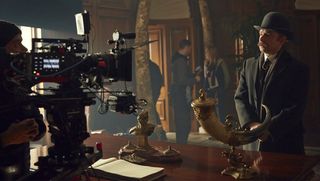
The emotional intimacy between Sherlock and John has (as in Doyle) been the show’s touchstone, and its homoerotic subtext is acknowledged early and often. On screen, characters habitually mistake the pair for a couple (including their devoted landlady, Mrs Hudson), while off-screen the show’s legion of devoted fans write fiction exploring every possibility of the ‘Johnlock’ romance. This, says Cumberbatch, is another aspect which plays differently in the period setting. “There are aspects to their relationship which seem different to us now, including that whole flirtation of ‘are they or aren’t they?’ As the showrunners and I know, they’re not, but people are sort of left to ponder, because there’s an attitude that two men of a certain age living together, well, they must be a couple. In Victorian London it feels a little bit less like that.”
Sign up to the SFX Newsletter
Get sneak previews, exclusive competitions and details of special events each month!
As for "The Abominable Bride", it’s a more oblique episode title than most – not since series one’s "The Great Game" has a name borne so little clear relevance to Doyle. There is a nod to canon there, but one so veiled only true die-hards will pick up on it: In "The Musgrave Ritual", Holmes makes a passing reference to a club-footed man named Ricoletti, and his “abominable wife”. This case is one of the many that Watson never bothered to write up in his journals, which leaves us with little to go on, and according to Gatiss the episode’s story is largely original.
Watching a rough cut of one early scene inside 221B Baker Street, which finds Holmes and Watson arriving home to an indignant Mrs Hudson, it’s striking how relatively unchanged the show’s language is. While the cast are clearly having fun with the heightened register, the rhythms are familiar – as Gatiss points out, one of Doyle’s great gifts was for snappy dialogue that doesn’t date. “If you read a real Doyle story, Holmes and Watson don’t talk very differently from us,” Moffat says, “but if you read a pastiche Doyle from somebody trying to write like him now, they talk like they’re from King Arthur’s round table!” Getting the script’s tone right took a few days, he says, until they realised the trick was in not overthinking the differences.
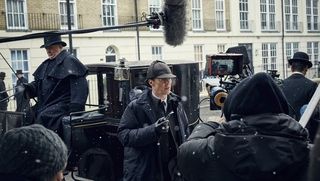
For Freeman, the need for Watson to choose his words more carefully makes for new shades to play in his bickering with Sherlock: “A gentleman was a gentleman back then, so you didn’t tend to go ‘Oh fuck off, you silly prick’ quite as much!’” That idea of a gentleman being a gentleman is even more compelling as applied to Holmes himself, who for all his oddness is depicted very much as just that in Doyle’s stories, in contrast to the chilly quasi-sociopath Cumberbatch plays. Freeman’s modern John is gentleman enough for the both of them, apologising on Sherlock’s behalf when he carelessly offends those around him, but has the reverse passage of time made our hero more courteous? Not significantly so, according to Cumberbatch. “There are always moments where it’s just too delightful not to play the comedy of that, whether it’s him not being able to cope with social norms, or someone else slowly catching up to his brilliance, the disparity between him and his environment. But he doesn’t feel such an oddity in this world.”
In all likelihood, "The Abominable Bride" will feel like a natural continuation of a show that has always peppered in nods to its Victorian roots – Sherlock’s loathed deerstalker and John’s equally loathed moustache made their debuts in series 2 and 3 respectively, and both are back here. The redressed 221B set is a joy to explore, a lovingly crafted replica of the pad we know and love with modern details swapped out for their period equivalents: a Macbook becomes a typewriter, the skull becomes a Victorian magic eye painting, the headphones an ear trumpet.
For all the success that Sherlock has enjoyed, for how influential it has become, for how thoroughly it has earned its place alongside the very best Holmes adaptations, it’s clear that Moffat and Gatiss still can’t quite believe their luck. Not for the show’s success, but for the fact that they’re allowed to play in this sandbox at all. It’s when they’re asked whether they can see an end in sight to the series that the full extent of their love for this world becomes clear. “The reason that Holmes and Watson have lasted 120 odd years is that they are immortal,” says Gatiss. “Doyle doesn’t bring them to an end, and every great version ends with them walking off into the sunset for other adventures, and then they just become somebody else.” "It’s not our show, in that way,” says Moffat, with touching reverence. “It’s Sherlock Holmes and Doctor Watson – they will be solving crimes in Baker Street long after everyone in this room is gone. You’re not entitled to end it.”
Sherlock, "The Abominable Bride" airs on BBC 1 and in selected cinemas on 1 Jan. For more about Sherlock's Christmas special, plus loads more features, news and crime drama entertainment, pick up a copy of Crime Scene magazine.
Images: BBC
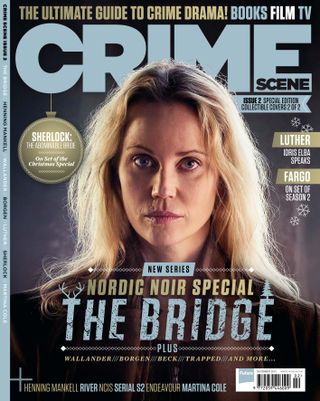
Emma Didbin is a writer and journalist who has contributed to 12DOVE, The New York Times, Elle, Esquire, The Hollywood Reporter, Vulture, and more. Emma can currently be found in Los Angeles where she is pursuing a career in TV writing. Emma has also penned two novels, and somehow finds the time to write scripts for Parcast – the Spotify-owned network that creates thrilling true crime and mystery podcasts.
